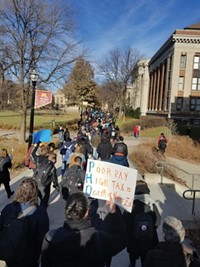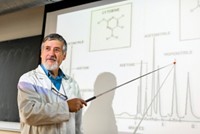Advertisement
Grab your lab coat. Let's get started
Welcome!
Welcome!
Create an account below to get 6 C&EN articles per month, receive newsletters and more - all free.
It seems this is your first time logging in online. Please enter the following information to continue.
As an ACS member you automatically get access to this site. All we need is few more details to create your reading experience.
Not you? Sign in with a different account.
Not you? Sign in with a different account.
ERROR 1
ERROR 1
ERROR 2
ERROR 2
ERROR 2
ERROR 2
ERROR 2
Password and Confirm password must match.
If you have an ACS member number, please enter it here so we can link this account to your membership. (optional)
ERROR 2
ACS values your privacy. By submitting your information, you are gaining access to C&EN and subscribing to our weekly newsletter. We use the information you provide to make your reading experience better, and we will never sell your data to third party members.
Business
Wisconsin Governor Guts Union Power
Workers' Rights: Chemistry personnel in state university system are among those affected
by Carmen Drahl
March 11, 2011
Numerous union staff in University of Wisconsin chemistry departments say they will be heavily affected by a new law that strips public employee unions of collective bargaining power, among other provisions. The legislation was signed today by Wisconsin Governor Scott Walker (R), who also rescinded 1,500 layoffs of state workers that he threatened if the bill did not make it to his desk.
"I find this very personally distressing. I've heard a lot of vilifying comments about teachers the last few weeks," says Brian Esselman, a chemistry teaching assistant at U. Wisconsin, Madison, and a former high school chemistry teacher. "We were willing to fix the problems, but that wasn't given to us as an option."
In Wisconsin and beyond, Walker has been cast as either villain or hero in a dramatic standoff between largely democratic pro-union activists and Republican elected officials who say deep budget cuts must be accompanied by a relinquishment of power on the part of public-employee unions.
State Senate Republicans in Madison ended the impasse on the bill by removing portions of the proposal so that it could be moved forward without Democrats, who had fled the state to prevent a vote. The Wisconsin State Assembly approved the bill Thursday. Democratic opponents are mounting legal challenges to the Senate's maneuver.
The surprise tactics of the Wisconsin State Senate spurred a new wave of angry protests. The Madison graduate student teaching assistants' union played a big role in mobilizing the campus with social media, says Esselman. "Facebook, Twitter and phone calls got a couple thousand people to the Capitol in a matter of an hour" when the union heard about the move.
The new law "is really a travesty," says U. of Wisconsin, Madison, chemistry professor Robert J. Hamers. The legislation "strips away 50 years of cooperation between the government and the state workers."





Join the conversation
Contact the reporter
Submit a Letter to the Editor for publication
Engage with us on Twitter